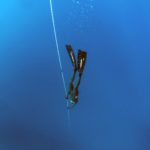
Why Are Freediving Fins So Long?

Why You Need a Freediving Buoy and Line

Best Freediving Snorkels Review

Best Freediving Fins for Beginners
Freediving, also known as breath-hold diving, is when one dives underwater without a breathing apparatus for as long and as far as they can go before resurfacing. You can freedive leisurely or competitively, and getting started is quite simple.
We do not recommend freediving as a hobby unless you are very comfortable in the water. In terms of equipment, all you need is a dive mask, snorkel, and freediving fins. Unlike SCUBA divers who dive with an air tank, freedivers must rely on their one single breath to take them as far as they can go.
Getting Started with Freediving
The sensation of reaching new depths and the rush of pushing past your limits may help to explain why so many enjoy this activity. Some freedivers find that they can enter a zen-like state while freediving by staying calm and concentrating on their breath as they head deeper toward the bottom.
Since you are limited by that one single breath you take before diving, it is important that you learn how to breathe properly as well as how to move efficiently in order to conserve oxygen.
Additionally, as mentioned above your mental state of mind is also crucial. Staying calm and collected is key to your success. Panicking while underwater will cause you to perform unnecessary movements, make mistakes, and force an early return. On top of that, any mistakes made while deep underwater can be life-threatening.
The first thing a beginner should do when starting out is to figure out how long they can stay underwater, and use this as a reference point to base future attempts on. In order for that one single breath to last a long time, you must make sure to keep your heart rate low and to take many slow, deep breaths prior to diving.
This helps calm you down and fill your lungs and muscles with oxygen. Alternate between inhaling for five seconds, then exhaling for ten to fifteen seconds. You want to breathe out for longer to ensure you are not hyperventilating.
